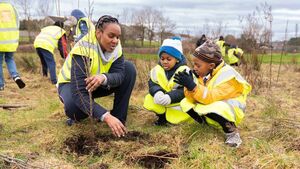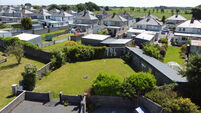We don't need an Ireland of fear and loathing

Priscilla Moyo and two of Castlebar Tidy Towns youngest volunteers pictured in 2023. Picture: John Mee
What does it mean to be Irish?
As a country with a long history of emigration, we are very aware of how fluid it can be. Someone may not be born here but may consider themselves more Irish than me or you.
The Achill Under 8 girls team I am involved with last week played a game against the visiting St Peter’s of Manchester. It was wonderful to hear the young Mancunian accents abound in Achill and watch them showcase their love for our native game and their grá for Ireland. Their sense of Irish identity is very strong.
The President of the United States of America can trace his roots back to Ballina. People were very happy to proclaim Joe Biden as Irish just as we were John Fitzgerald Kennedy.
Yet many who claim to be patriots do not consider many people born here or people who moved here and call Ireland home to be Irish, in spite of all our new residents bring to our country. They appear wilfully ignorant of all the good that immigration can bring.
If you happened to require the services of Mayo University Hospital in recent times, as I have on several occasions with our five-year-old son, you would be very grateful for the Indian and Filipino nurses without whom our ailing health service would completely cease to function. Our hospitality sector would collapse were it not for people who have moved to Ireland and are willing to work in what are often low-paid jobs.
While there may be aspects of immigration that need better management, the overarching reality is that immigration is good for Ireland. It has been for decades and will continue to be into the future.
Thousands upon thousands of people have moved into Ireland and are working very productively in our growing economy and offering a huge amount of social good. We would be in serious difficulty without them, in health, in hospitality, in education, across the whole economy.
Many of those currently in the International Protection Accommodation Services (IPAS) system will also go on to become very positive, contributing members of our society.
It is an emotive issue right now. People in Ballina will not need reminding of this following the recent controversy over the plans to use part of the Twin Trees Hotel to house 120 IPAS applicants.
There are some reasonable concerns. Like any issue, there needs to be controls. Illegal immigration needs to be better monitored and enforced. The use of hotels in many towns as IPAS centres is a flawed strategy when there are many civic buildings lying idle which could be repurposed, not to mention all the empty and derelict houses in the country. Hotel owners are making a small fortune right now but who could blame them?
There are not enough supports on the ground to give immigrants the chance to assimilate into communities. There are arguments about capacity which might be true in some areas but, despite the social media hashtag, Ireland is a long way from being full if we manage this issue with a bit more creativity and imagination.
There are many arguments put forward for ‘not in my town’, the single biggest one being that local services cannot cope with the additional numbers. We have heard many protest groups claiming that their community cannot take the various numbers of people due to come into their area.
This has been voiced in Ballina, in spite of the fact that it is just 120 people coming into a community of over 10,000.
In Breaffy House Resort, there are approximately 700 refugees and international protection applicants. As a native of Breaffy and someone who has family living there, I would initially have had concerns that this number would be too great for a small village such as Breaffy, albeit one in close proximity to Castlebar.
However, over a year on, I have witnessed no negative impact on Breaffy itself. Quite the opposite. Many new residents volunteer with Castlebar Tidy Towns and contribute more to the community than some of those who now seek to sow fear and panic in communities around the country.
Access to health services in Castlebar is a huge problem but it did not just magically appear in the past 12 months – I have been covering issues at Mayo University Hospital for over a decade.
Clearly, the goalposts will move on this issue depending on what the ‘reasonable’ objection is for people.
In some areas, like Ballina, we are told it is damage to tourism. The Government and the State are not nearly creative enough in repurposing idle civic or State buildings around the country. Would the Military Barracks not be suitable in Castlebar rather than using office buildings in a business park?
Yet we know that when such vacant buildings or modular homes are proposed, it seems to be met with protest right across the country. Witness the initial reaction to the plans for modular homes in Claremorris.
The goalposts will move and if the tourism card is not used, another one from the playbook will be deployed instead. In Achill, and elsewhere pre-Covid, it was argued that direct provision was ‘inhumane'. In Ballinrobe, proximity to a creche was used as one of the main arguments. That is quite revealing as to how many protestors view international protection applicants, i.e. that they are a danger to society.
It is curious to see people mobilising on this issue yet standing idly by when massive social problems are prevalent in this country – look at health and housing, for instance. In Ballinrobe, where some locals – and many neither from nor resident in the town – protested over plans to house international protection applicants in the vacant Gannon’s Hotel, there have been massive social issues over the last decade, including a drug feud which led to horrific assaults and gang warfare in the heart of the town itself.
There was no mobilisation for that.
When you see people travelling from all over the country to protest, you have to wonder about their bona fides. The news that a survey of social media posts on the Newtownmountkennedy protest revealed only 20% of posts came from Ireland with 50% originating from the USA makes one wonder who is pulling the strings here. The phrase ‘useful idiots’ springs to mind.
Some will argue that they will welcome people fleeing war and persecution – though some bottom dwellers won’t even stretch the hand of friendship for that – but not for what they term ‘economic migrants’.
These are people who are looking for a better life for themselves. Do we really need to reprise our own history? We are a nation of economic migrants who, for centuries, fled to the four corners of the world in search of a better life. Many of our brightest and best, especially in the west of Ireland, must continue to do so.
Sure, arguments can be made about capacity and limits but many are simply seeking to pull up the drawbridge and anyone less fortunate than us can sod off.
Another anti-immigrant argument concerns social welfare payments. Well, you won’t get rich in the IPAS system with an allowance of just €38.80 per week.
I’ve heard many proclaim that when the Irish were emigrating across the decades, that ‘everywhere we went, we worked’, and that ‘we didn’t rely on handouts’. Certainly, our capacity for hard work is a proud part of our legacy but the welfare state is also a very important construct in the modern world. No doubt many of those who have time to travel to protests all around the country are familiar with the assistance it provides.
Anyone who has ever been in any of the Irish drinking dens around Cricklewood in London will know about meeting those who didn’t ‘make it’ and who didn’t have sufficient support to fall back on. They won’t look you in the eye and are afraid to say where they are from in case you know their people and that their family at home might hear that they are ‘down and out’.
While some of those coming may well be capable of acts of criminality, there is no evidence that there has been an increase in crime in proportion to the number of immigrants who have entered this country.
There will be bad eggs from every community. Again, do we have to go over the damage generalisations can cause? Recall what it was like to be Irish in England during the Troubles and your accent marked you out as someone not to be trusted, that you were either part of the IRA or sympathetic to them. Recall the signs in England that read ‘No Blacks, No Dogs, No Irish’.
Are we still that ignorant about our own past? It seems some of us are.
There may be particular arguments in particular areas that stand up, but when looked at in its totality across the country, it is clear that there are two overarching themes – fear and racism. And those guilty of the latter, nothing more than merchants of hate, are more than content to peddle the former. I’ve seen them in action and they are not pleasant people. They intimidate, they stoke fear, they harass, they scaremonger.
Do we want to live in a country fuelled by fear and loathing? Do we want a culture of xenophobia against those who do not look quite the same as us?
That’s not the type of Irishness I want to be associated with.




